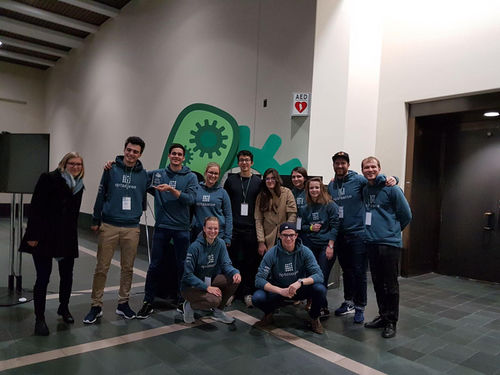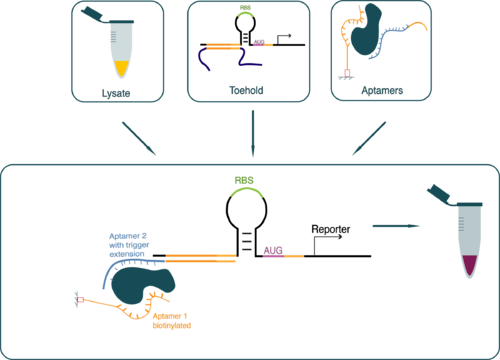Difference between revisions of "20180228 OH191"
| (6 intermediate revisions by the same user not shown) | |||
| Line 1: | Line 1: | ||
| + | [[File:EPFL_iGEM_1.jpg|frameless|right|500px]] | ||
| + | |||
Open Hackuarium #191 - EPFL iGEM is visiting Hackuarium! <br> | Open Hackuarium #191 - EPFL iGEM is visiting Hackuarium! <br> | ||
Organisé par [[User: luchenry | Luc Henry]]<br> | Organisé par [[User: luchenry | Luc Henry]]<br> | ||
| + | |||
| + | <br> | ||
'''ENGLISH BELOW''' <br> | '''ENGLISH BELOW''' <br> | ||
| Line 8: | Line 12: | ||
* Date : '''Mercredi 28 février 2018, 19h''', présentation et discussion à 19:30 et jusqu'à 21h | * Date : '''Mercredi 28 février 2018, 19h''', présentation et discussion à 19:30 et jusqu'à 21h | ||
* Lieu : Salle "Gaston Lagaffe", UniverCité, 3ème étage | * Lieu : Salle "Gaston Lagaffe", UniverCité, 3ème étage | ||
| − | |||
| − | |||
| − | |||
- - - - - - - - - - - - - - - - - - - - - - - - - - - - - - - - -<br> | - - - - - - - - - - - - - - - - - - - - - - - - - - - - - - - - -<br> | ||
| − | |||
| − | |||
* Main language this week: '''English'''<br> | * Main language this week: '''English'''<br> | ||
| Line 20: | Line 19: | ||
* Date: '''Wednesday 28 February 2018, 19:00''', presentation and discussion start at 19:30 | * Date: '''Wednesday 28 February 2018, 19:00''', presentation and discussion start at 19:30 | ||
* Location: Room "Gaston Lagaffe", UniverCité, 3rd Floor | * Location: Room "Gaston Lagaffe", UniverCité, 3rd Floor | ||
| + | |||
| + | <br> | ||
| + | |||
| + | '''Summary:'''<br> | ||
Each year, the International Genetically Engineered Machine ([http://2017.igem.org/Main_Page iGEM]) competition brings together international teams of students from high schools and universities from all over the world to present synthetic biology projects.<br> | Each year, the International Genetically Engineered Machine ([http://2017.igem.org/Main_Page iGEM]) competition brings together international teams of students from high schools and universities from all over the world to present synthetic biology projects.<br> | ||
| − | With their project, the [http://2017.igem.org/Team:EPFL/Team EPFL iGEM team] won a gold medal in the category "Best Education & Public Engagement". They were also nominated in four other categories: "Best Diagnostics Project", "Best Integrated Human Practices", "Best New Basic Part" and "Best Software". An article about this achievement can be found [https://actu.epfl.ch/news/epfl-team-wins-gold-in-igem-2017-competition/ here].<br> | + | With their project, the [http://2017.igem.org/Team:EPFL/Team EPFL iGEM team] won a gold medal in the category "Best Education & Public Engagement". They were also nominated in four other categories: "Best Diagnostics Project", "Best Integrated Human Practices", "Best New Basic Part" and "Best Software". An article about this achievement can be found [https://actu.epfl.ch/news/epfl-team-wins-gold-in-igem-2017-competition/ here]. More information about the EPFL project can also be found on the team webpage [http://2017.igem.org/Team:EPFL here].<br> |
| + | |||
| + | <br> | ||
| + | |||
| + | They come to Hackuarium to present their project and discuss what they have learnt in the process.<br> | ||
| − | + | <br> | |
| − | + | '''The Project in More Details:'''<br> | |
| − | + | The emerging field of cell-free synthetic biology promises to significantly improve molecular diagnostics. Cell-free systems for engineering and implementation allows for fast testing cycles, ready-to-use detection devices, better biosafety, as well as cheap and easy transport and storage. Previously, Pardee et al. developed a cell-free system for detecting viral RNA in patients by engineering toehold switches coupled to lacZ for signal generation. Since many clinical tests rely on the detection of protein biomarkers, we developed a novel scheme for detecting proteins by coupling aptamer based affinity reagents to the toehold-switch concept in cell-free system. We furthermore improved on various aspects of the original Pardee cell-free system to create a tool that is more effective, cheaper and easier to use. Because the system can be rapidly engineered and deployed, and all parts can be modified to recognize different protein or RNA molecules, it’s a highly modular and novel diagnostic tool.<br> | |
| + | |||
| + | <br> | ||
| + | |||
| + | [[File:EPFL_iGEM_3.png|300px]] | ||
| − | + | <br> | |
[[File:EPFL_iGEM_2.png|500px]] | [[File:EPFL_iGEM_2.png|500px]] | ||
Latest revision as of 14:02, 22 February 2018
Open Hackuarium #191 - EPFL iGEM is visiting Hackuarium!
Organisé par Luc Henry
ENGLISH BELOW
- Langue principale cette semaine: Anglais
- Thème : Aptasense - Une bio-senseur synthétique pour le diagnostique
- Date : Mercredi 28 février 2018, 19h, présentation et discussion à 19:30 et jusqu'à 21h
- Lieu : Salle "Gaston Lagaffe", UniverCité, 3ème étage
- - - - - - - - - - - - - - - - - - - - - - - - - - - - - - - - -
- Main language this week: English
- Theme: Aptasense - A synthetic biosensor with diagnostics applications
- Date: Wednesday 28 February 2018, 19:00, presentation and discussion start at 19:30
- Location: Room "Gaston Lagaffe", UniverCité, 3rd Floor
Summary:
Each year, the International Genetically Engineered Machine (iGEM) competition brings together international teams of students from high schools and universities from all over the world to present synthetic biology projects.
With their project, the EPFL iGEM team won a gold medal in the category "Best Education & Public Engagement". They were also nominated in four other categories: "Best Diagnostics Project", "Best Integrated Human Practices", "Best New Basic Part" and "Best Software". An article about this achievement can be found here. More information about the EPFL project can also be found on the team webpage here.
They come to Hackuarium to present their project and discuss what they have learnt in the process.
The Project in More Details:
The emerging field of cell-free synthetic biology promises to significantly improve molecular diagnostics. Cell-free systems for engineering and implementation allows for fast testing cycles, ready-to-use detection devices, better biosafety, as well as cheap and easy transport and storage. Previously, Pardee et al. developed a cell-free system for detecting viral RNA in patients by engineering toehold switches coupled to lacZ for signal generation. Since many clinical tests rely on the detection of protein biomarkers, we developed a novel scheme for detecting proteins by coupling aptamer based affinity reagents to the toehold-switch concept in cell-free system. We furthermore improved on various aspects of the original Pardee cell-free system to create a tool that is more effective, cheaper and easier to use. Because the system can be rapidly engineered and deployed, and all parts can be modified to recognize different protein or RNA molecules, it’s a highly modular and novel diagnostic tool.


